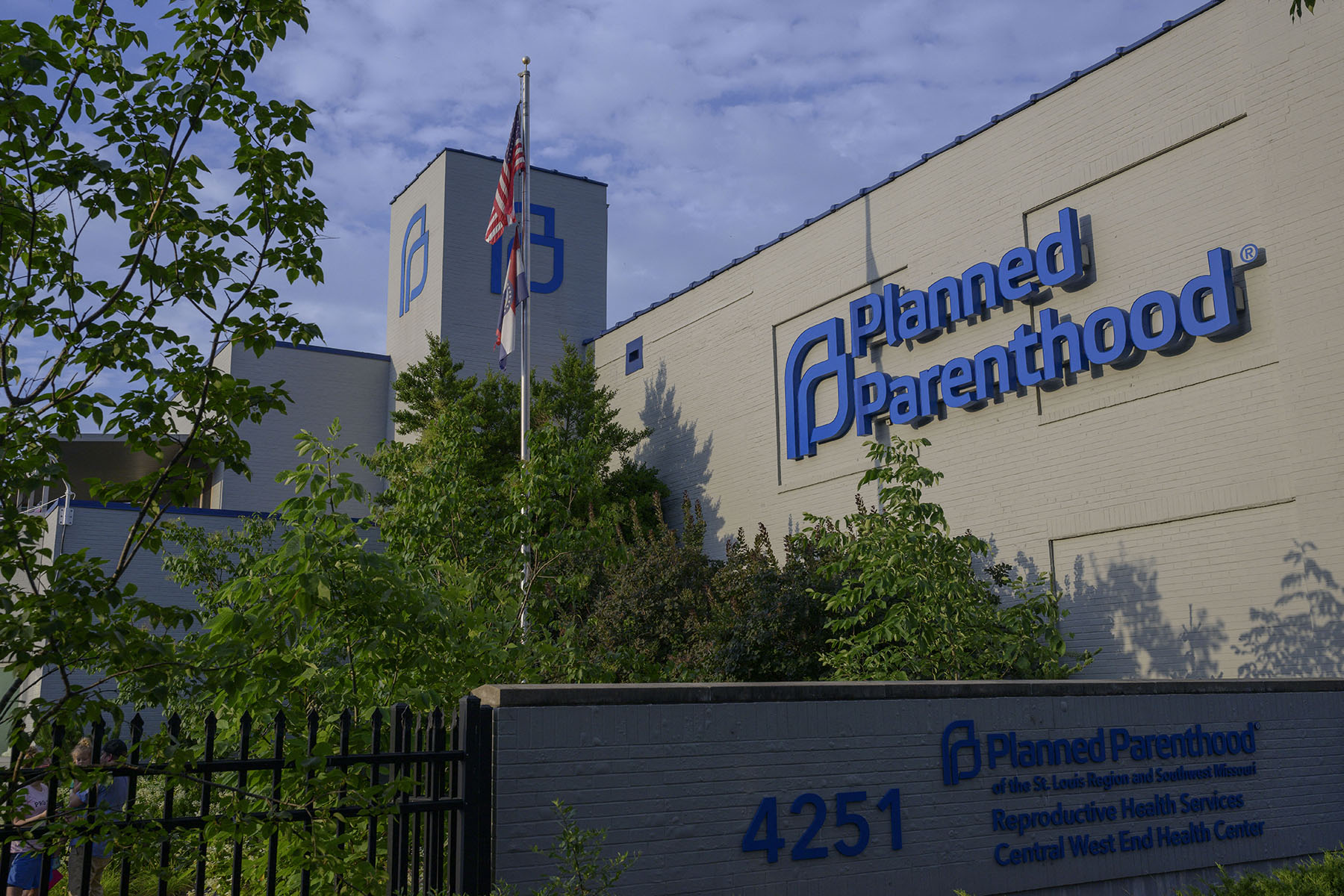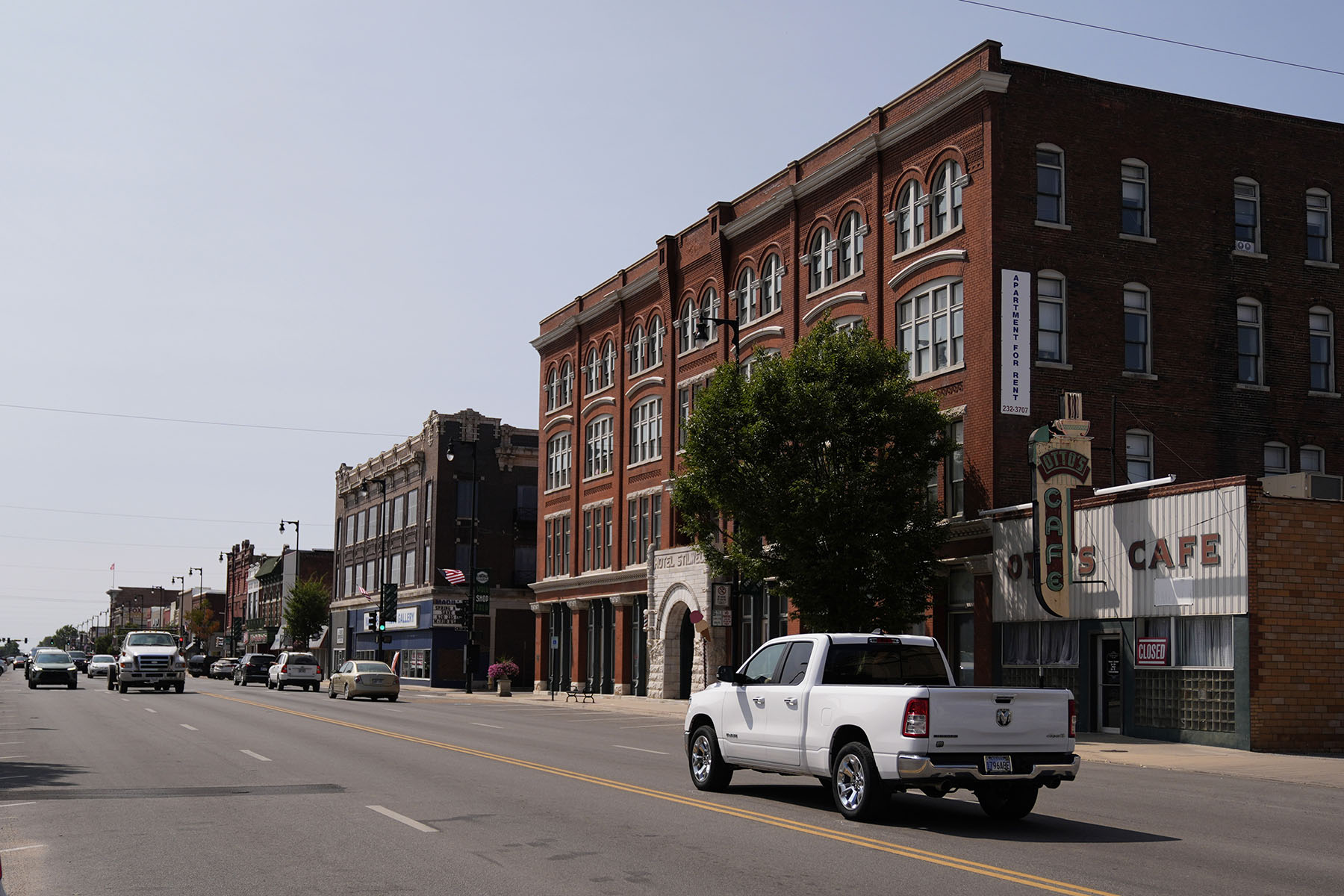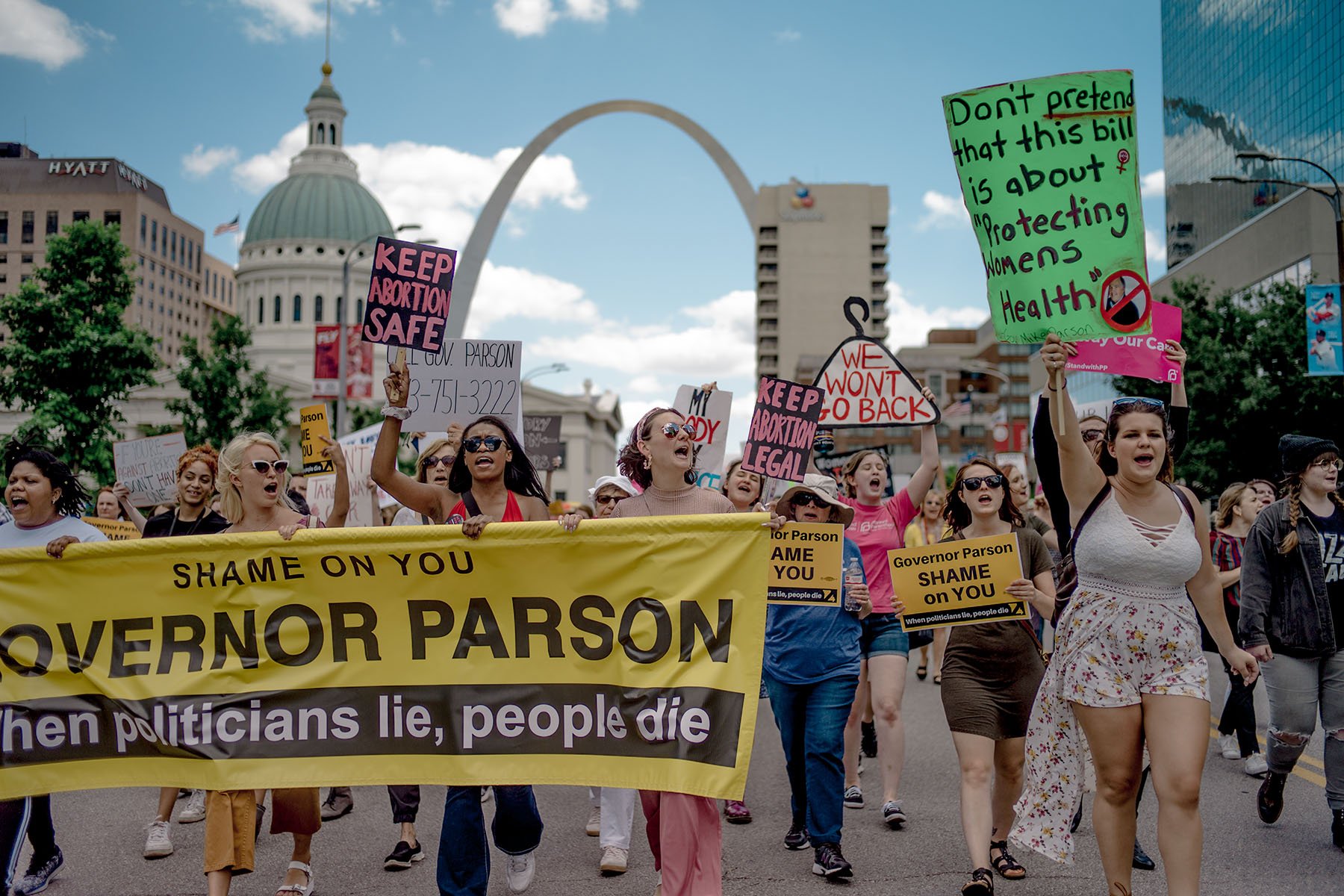This article was co-published with The Daily Yonder as part of The 19th News Network’s Abortion on the Ballot series.
Nicole was driving when she heard on the radio that Roe v. Wade had fallen, and that soon abortion would be almost completely illegal in her home state of Missouri. She thought first of her children, two teenagers who she feared might someday need reproductive health care, including abortion.
She worried far less about herself. She was in her late 30s, and she was done having children. She had an intrauterine device, one of the most effective forms of birth control. The odds of an abortion ban affecting her directly seemed slim.
Then six weeks later, Nicole took a pregnancy test. It came back positive.
“It kind of flooded me a second time like, ‘Oh, I don’t have reproductive health options,’” Nicole said. “Instantly, I was like, ‘Oh, I have to terminate this pregnancy.’ It wasn’t even like a hard decision.”
Nicole discussed her options with her husband. She telephoned clinics in Kansas City, Kansas, and Granite City, Illinois, both close to a three-hour drive from southwest Missouri, where she lived in a small city surrounded by more rural areas. The couple discussed how much it would cost to go to either clinic: for the gas, the abortion itself, maybe a hotel if they had to make the trip over two days. It was hard to imagine how they would make it work.
So instead, she went onto a website called Plan C Pills. Nicole, who The 19th is referring to by her middle name because of the legal murkiness of ordering and using abortion pills in Missouri, found a service that would mail the pills for an abortion to her home, and that would connect her with a physician for advice. Nicole ordered the medication. Abortion bans like Missouri’s don’t criminalize pregnant people like Nicole, but she was still terrified of legal consequences, keeping it a secret from her OB-GYN and fellow members of her church.
“I couldn’t tell anyone,” she said.
-
Read Next:
Medication abortion is highly effective, especially for people in the first trimester of pregnancy, as Nicole was. The chances of complications are very low. Still, she and her husband made contingency plans in case anything went wrong, in case she was one of the rare people who required hospital care. They didn’t want to risk going to an emergency room that might be constrained by Missouri’s abortion law — so instead, they mapped out the fastest route to Kansas.
Nicole’s abortion was, like most medication abortions, a simple process. She took the day off work and rested on the couch with her husband on a heating pad, waiting for the pills to help her pass the pregnancy.
In some ways, Nicole’s options would have been limited well before the 2022 fall of Roe, thanks to a long, successful effort by conservative legislators trying to regulate providers out of business in Missouri. In 1982, almost 30 clinics provided abortions in the state. By 1999, it was home to five abortion clinics. By 2018, only one, a Planned Parenthood in St. Louis, offered abortions. In 2021, the last full year before Roe’s fall, the Centers for Disease Control and Prevention recorded only 150 abortions in the entire state, lower than almost anywhere else in the country.
The effects were more acute in the state’s rural areas, home to one-third of Missourians. With each clinic closure, residents were increasingly left with few, if any, options to get an abortion. In southwest Missouri, the closest options for an abortion since 2018 would have been Kansas City, Kansas, or St. Louis. Nicole would have been required to make two visits to a clinic separated by 72 hours. Telemedicine, a medically safe option for abortion, wouldn’t have been legally available to her.

“The whole state has been designated a maternal health care desert, but in rural places in Missouri — even when Roe v. Wade was law of the land, there was no access,” said Denise Lieberman, a lawyer in the state who teaches about gender, sexuality and law at Washington University in St. Louis.
That history will come under new scrutiny this November, when Missouri will be one of 10 states to directly vote on abortion rights and could potentially reverse its near-total abortion ban. In the Show-Me State, voters will weigh in on whether to amend the state constitution to protect abortion rights up until fetal viability, which typically occurs around 23 to 25 weeks. Supporters are optimistic. Polling suggests most residents support the measure, Amendment 3, and similar efforts have succeeded in other conservative-run states. In Missouri, where Republicans control the state legislature and governor’s mansion, a ballot measure is the only viable way to undo the ban.
But even if the measure passes, abortion will likely remain limited in the immediate and near future, thanks to that complex maze of anti-abortion restrictions that chipped away at abortion availability for so many years. It will be rural Missouri — where poverty rates are higher and health care is harder to come by — that will have the steepest hill to climb.
Still, one element would change drastically for people like Nicole, even without a single new clinic opening or offering abortion services. The fear she felt — the one that left her unable to tell her doctor or trust a hospital to care for her in case of an emergency — would evaporate.
“It’s the difference between knowing that you can talk to people, knowing that you don’t have to be in secret, that you can go to your doctor,” she said. “It sounds so simple, but when you cannot talk to a medical doctor about something that’s going on with you — it’s hard for people to understand that feeling until it happens to them, that fear that grips you.”
More than a century before Roe, Missouri was a leader in restricting abortion, becoming, in 1825, the first state in the country to ban the procedure throughout pregnancy. Even after the Supreme Court’s 1973 ruling established a constitutional right to abortion, state lawmakers devoted themselves to a decades-long project chipping away at Missouri’s reproductive health infrastructure.
In 1986, the state helped develop the blueprint for clinic regulations that, while not medically necessary, could make abortions harder to provide, passing one of the first laws that prohibited state-funded health facilities from providing abortions, and that required that doctors who perform the procedure have admitting privileges at nearby hospitals.
Over the years, lawmakers passed more and more restrictions, which combined to make it in some cases prohibitively expensive to provide abortion, particularly in areas further away from Missouri’s two largest cities, Kansas City and St. Louis. Redesigning clinics to comply with the same regulations as ambulatory surgical centers — outpatient medical facilities that focus on surgical services more complex than most abortions, such as cataract surgery or kidney stone removal — cost clinics hundreds of thousands of dollars. Identifying local hospitals willing to grant admitting privileges was more difficult in regions with fewer such health providers. And it became functionally impossible for some clinics to find doctors able to commit to being in the clinic multiple times in a week — especially those who were driving in from Missouri’s major metropolitan areas.
While abortion remained an option in St. Louis — both in the city and just across the state border in southern Illinois — as well as in Kansas City, which neighbors the Kansas border, by 2022 it was long gone in the bulk of the state.
“There are stories that bubble up in so many parts of the country that it’s been two years since the Dobbs decision [that overturned Roe]. For people in mid-Missouri, it’s been much more than that,” said Emily Wales, the head of Planned Parenthood Great Plains, which operates multiple clinics in Kansas and Missouri. “Central Missouri didn’t wake up to this reality two years ago. They woke up to it many more years ago.”

People in the state’s biggest cities are more likely to be able to travel across state lines for care. Outside of those metro areas, it’s a different story.
“You’ve got a state that is largely rural, and there isn’t public transportation around the state. It’s very difficult to get from one place to another if you don’t have a car, if you don’t have funds,” Lieberman said. “Those same barriers limit people from getting appropriate prenatal care in the first place, before they have a situation that requires them to access abortion.”
The option for doctors to care for patients facing medically complex pregnancies has even greater implications for rural Missourians, whose risk of pregnancy-related death is greater than their urban counterparts.
But traveling across the state can impose a massive burden, said Dr. Mukerji, a maternal-fetal medicine specialist in Kansas City, Missouri, who asked that The 19th refer to her by her mother’s maiden name because of her employer’s concern about the political sensitivity of talking about abortion. She frequently sees patients who require complex pregnancy care from other parts of the state because there are no specialists closer to home. Some come as far as five or six hours away.
“It is a constant conversation,” she said. “Sometimes they don’t necessarily have multiple vehicles for family, sometimes they don’t have a vehicle in the family at all. And the gas is expensive. You need someone to take care of the family you’re leaving behind. Expense is always a part of conversation when people are traveling more than a comfortable distance.”
Plans are underway for if Amendment 3 passes. Leaders at Planned Parenthood Great Plains hope to resume offering abortions in Kansas City and Columbia, a college town in the heart of the state that offered the procedure until October 2018. They’re training staff and recruiting physicians, though it’s not clear how many days they would offer the service or how many patients they expect to serve.
Columbia is surrounded by rural communities, and an abortion clinic there would offer patients another option that doesn’t require trekking to St. Louis or Kansas City. State health data shows that in 2018, when abortions were available for most of the year in both Columbia and St. Louis, Missouri recorded just under 3,000 abortions in a year. The next year — after the Columbia clinic stopped offering abortions — the tally fell to just under 1,500 abortions. By 2020, with the state’s last abortion clinic under siege, and patients increasingly crossing the river to neighboring Illinois for care, the number fell even further: Only 167 abortions took place in Missouri.
Historically, patients who came to the clinic for abortions traveled from as far as southwest Missouri and even Iowa, said Vicki Casey, the Columbia-based director of centralized operations at Planned Parenthood Great Plains. Even now, the clinic, which still provides other reproductive health services, sees patients traveling from near the Ozarks, about an hour and a half away.
If the clinic were to resume providing abortions, that change wouldn’t take place immediately. Amending the constitution doesn’t automatically reverse Missouri’s abortion laws — which in addition to a near-total ban on the procedure, include the maze of onerous regulations on health care providers that effectively prevented clinics from offering abortions even before the ban was in place. Those will all have to be litigated in the state courts, a process that will require abortion providers to file lawsuits challenging those individual laws. The process could take anywhere from months to years.

“Certainly having an abortion clinic operating — providing a meaningful number of appointments per week, with some sort of financial assistance available — would be tremendous in the middle of the state. I think it would be amazing,” said Stephanie Kraft Sheley, a lawyer and the director of Right By You, a Missouri-based organization that works to inform residents of their legal abortion options. “I have questions about when that could even possibly happen.”
Even before Roe’s fall, the Columbia clinic had for years offered abortion in fits and starts, a product of the difficulties in recruiting providers and the heightened legal scrutiny providers faced in the state. In 2012, the clinic had to halt offering the procedure when the physician who provided abortions moved away, only able to resume three years later after finding a new doctor, and then halting again five months later when the local hospital, responding to pressure from conservative state lawmakers, stopped granting admitting privileges to doctors who provided the service. In 2017, a court allowed it to once again provide abortions — only to have that decision blocked in 2018 by an appeals court.
Doctors across the state say they expect that kind of legal back-and-forth once more, even if the state constitution is amended to protect abortion rights. Missouri lawmakers fought to keep the state’s abortion rights measure off the ballot this year, a battle that went up to the state Supreme Court. Passage is no guarantee that state leadership will comply without being forced to. When Missouri residents voted in 2020 to expand eligibility for Medicaid, which provides health insurance for low-income people, the state initially refused to actually implement the change, only yielding after a legal battle.
Kraft Sheley also pointed to another underlying challenge: For years, Missourians have grown used to not having abortion as a legal option. Spreading the word if it is available will require massive public education efforts.
“When a ballot measure passes, that doesn’t change decades of people being told abortion is illegal and dangerous. It doesn’t change decades of creating a training or medical practice gap,” said Erin Grant, who heads the Abortion Care Network, a national coalition of independent abortion providers. “It doesn’t change that providers will have to build back relationships with the community. People won’t know that they’re there.”
It’s not clear where else abortion might be available in the state, or on what timeline. A separate entity, Planned Parenthood Great Rivers, also has several Missouri clinics, including in St. Louis, and further southwest in Springfield and Joplin. But the organization didn’t specify which of those facilities, if any, might provide abortions if the ballot measure passed. The Joplin clinic is set to close in January 2025, due to a combination of factors including low foot traffic, an organizational shift to prioritize telemedicine, and financial pressures in part thanks to the state Medicaid program’s recent shift to stop covering any health service provided by Planned Parenthood.
“After Missouri voters pass this ballot measure to end our state’s total abortion ban, we’ll work swiftly to ensure patients can come to our health centers for the broad range of sexual and reproductive care, including safe, legal abortion,” Nick Dunne, a Planned Parenthood Great Rivers spokesperson, said in a statement.
If even a few more clinics could provide abortion, the implications would be tremendous, said Dr. Jennifer Smith, an OB-GYN who practices in St. Louis and who has worked in the state for about 20 years. But she anticipates that for many patients, abortion will remain difficult to obtain, especially those who don’t live off the state’s major highways.
If both Kansas City and Columbia were home to abortion providing clinics, that would shrink the travel distance necessary for patients living in the state’s non-metropolitan areas by only 19 miles on average, per data analyzed by The Daily Yonder and The 19th. But for a quarter of those residents, the change would be more substantial — cutting the distance to an abortion clinic by more than 60 miles.
“It helps, but people still are going to have to drive hours,” Smith said. “We will be doing much better than we have in a couple decades, but it certainly isn’t going to be perfect.”
And doctors who work in or near the state’s rural areas said it’s difficult to imagine abortion providers returning in the near future — in part because of the legacy of violence against abortion providers in and near Missouri.
Springfield became home to the first shooting targeting an American abortion clinic in 1991. In 2013, a man attempted multiple times to set fire to the Planned Parenthood clinic in Joplin, citing its status as a reproductive health provider. Five years later, a man in Columbia launched a Molotov cocktail at the local Planned Parenthood, even though it also no longer provided abortions. The 2009 murder of Dr. George Tiller, an abortion provider in neighboring Kansas, still haunts many physicians.
“There’s definitely an undercurrent of violence that is very concerning for anyone who’s going to step up and provide abortion care,” said Dr. Elizabeth Griswold, a maternal fetal medicine specialist who sees patients in Kansas City as well as Indiana.
The fear is more potent closer to the state’s more rural, and often more conservative, communities, said Dr. David Mehr, a semi-retired family physician in Columbia who has practiced in Missouri since the 1980s, and who has been campaigning door-to-door on behalf of the ballot measure. While polling shows that abortion rights are popular, he said, it can feel as if anti-abortion activists pose a distinct risk. Years ago, he said, one of his colleagues stopped offering the procedure after being followed home. The fact that the local hospital does not offer the procedure or work with doctors who do adds another layer.
That fear is why one doctor, an OB-GYN who regularly travels to Springfield — about two-and-a-half hours from Kansas City and three hours from St. Louis — and another nearby small town said she herself probably wouldn’t want to work in a abortion clinic if asked.

“I’m afraid of the anti-choice people harming my family. The threats against abortion providers are real,” said the doctor, whose name The 19th is withholding because she fears professional retaliation.
That said, if abortion rights are restored in Missouri, it could have some immediate impacts. The state’s strict ban has deterred physicians from providing life-saving care for patients whose pregnancies have gone awry, and where the standard of care involved termination.
Mehr said that while he believed few doctors would feel safe providing abortions — especially given the political climate — a constitutional abortion right would still give them security in providing basic medical care.
“Providers would not be faced with the fear of being prosecuted and being sent to jail for providing just good standard medical care to women with nonviable pregnancies, people who are miscarrying, people who have ectopic pregnancies,” Mehr said. “Women would have to travel less far — they still maybe wouldn’t be able to get abortion services in their community if they live in a rural area — but their health would be protected and their decision-making protected.”






